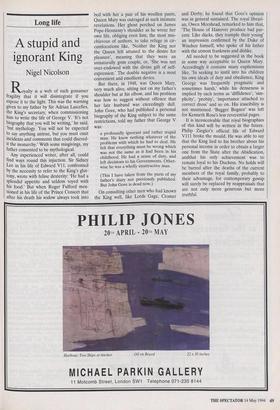Long life
A stupid and ignorant King
Nigel Nicolson
Roy.), is a web of such gossamer fragility that it will disintegrate if you expose it to the light. This was the warning given to my father by Sir Adrian Lascelles, the King's secretary, when commissioning him to write the life of George V. 'It's not biography that you will be writing,' he said, but mythology. You will not be expected to say anything untrue, but you must omit incidents and comments that could discred- it the monarchy.' With some misgivings, my father consented to be mythological.
Any experienced writer, after all, could find ways round this injuction. Sir Sidney Lee in his life of Edward V11, confronted by the necessity to refer to the King's glut- tony, wrote with feline dexterity: 'He had a splendid appetite and seldom toyed with his food.' But when Roger Fulford men- tioned in his life of the Prince Consort that after his death his widow always took into bed with her a pair of his woollen pants, Queen Mary was outraged at such intimate revelations. Her ghost perched on James Pope-Hennessy's shoulder as he wrote her own life, obliging even him, the most mis- chievous of authors, to take refuge in cir- cumlocutions like, 'Neither the King nor the Queen felt attuned to the desire for pleasure', meaning that they were an unnaturally grim couple, or, 'She was not over-endowed with the divine gift of self- expression.' The double negative is a most convenient and emollient device.
But there, in 1948, was Queen Mary, very much alive, sitting not on my father's shoulder but at his elbow, and his problem was how to suggest without offence that her late husband was exceedingly dull. John Gore, who had published a personal biography of the King subject to the same restrictions, told my father that George V was:
a profoundly ignorant and rather stupid man. He knew nothing whatever of the problems with which he had to deal. He felt that everything must be wrong which was not the same as it had been in his childhood. He had a sense of duty, and left decisions to his Governments. Other- wise he was a wholly unattractive man.
(This I have taken from the parts of my father's diary not previously published. But John Gore is dead now.) On consulting other men who had known the King well, like Lords Gage, Cromer and Derby, he found that Gore's opinion was in general sustained. The royal librari- an, Owen Morshead, remarked to him that, `The House of Hanover produce bad par- ents. Like ducks, they trample their young' an impression confirmed by the Duke of Windsor himself, who spoke of his father with the utmost frankness and dislike.
All needed to be suggested in the book in some way acceptable to Queen Mary. Accordingly it contains many euphemisms like, `In seeking to instil into his children his own ideals of duty and obedience, King George was frequently pragmatic and sometimes harsh,' while his denseness is implied by such terms as `diffidence', 'sim- plicity', 'probity', 'importance attached to correct dress' and so on. His irascibility is not mentioned. 'Bugger Bognor' was left for Kenneth Rose's less reverential pages.
It is inconceivable that royal biographies of this kind will be written in the future. Philip Ziegler's official life of Edward V111 broke the mould. He was able to say that the King lied to his brother about his personal income in order to obtain a larger one from the State after the Abidication, andthat his only achievement was to remain loyal to his Duchess. No holds will be barred after the deaths of the current members of the royal family, probably to their advantage, for contemporary gossip will surely be replaced by reappraisals that are not only more generous but more truthful.


























































 Previous page
Previous page